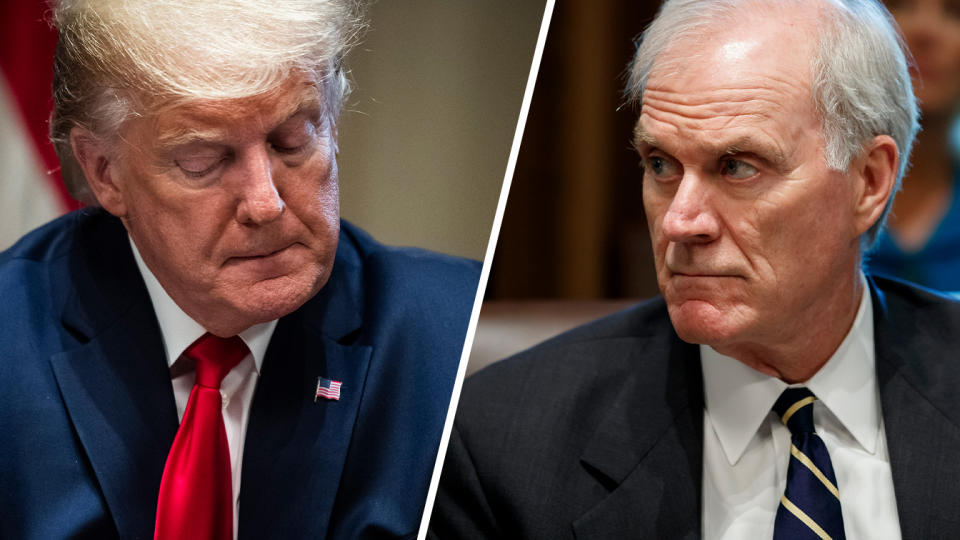What is 'good order' and why does it matter for the military?
In his letter to President Trump, Richard Spencer, the Navy secretary who was fired on Sunday, said he no longer shared the “same understanding” of “good order and discipline” with the commander in chief. The term has come up repeatedly in myriad recent scandals involving the Navy SEALs.
“Unfortunately, it has become apparent that in this respect, I no longer share the same understanding with the Commander in Chief who appointed me, in regards to the key principle of good order and discipline,” Spencer wrote.
In the letter, Spencer said the rule of law is “what sets us apart from our adversaries.”
“Good order and discipline is what has enabled our victory against foreign tyranny time and again,” he added, “from Captain Lawrence’s famous order ‘Don’t Give up the Ship,’ to the discipline and determination that propelled our flag to the highest point of Iwo Jima.”

Spencer’s focus on “good order and discipline” is one that has been top of mind for Navy leadership in recent years as charges of murder, sexual assault and drug use have rocked the SEALs. The concept can be difficult to define, but Trump’s actions appear to put him at odds with Rear Adm. Collin Green, head of Naval Special Warfare Command, who said earlier this year that “we have a good order and discipline problem that must be addressed immediately.”
Spencer was fired over his differences with the president about plans to discipline Eddie Gallagher, a SEAL team chief who was accused of stabbing a teenage Islamic State prisoner to death and taking sniper shots at civilians, striking a young girl and an old man carrying water. In July, Gallagher was found not guilty of the murder charge despite testimony from his fellow SEALs. He was eventually found guilty of bringing discredit to the armed forces by posing for photos with the captive’s dead body, which resulted in a demotion.
Trump, going against the wishes of top Pentagon officials, pardoned Gallagher, along with two other service members who were accused or convicted of war crimes, and reversed his demotion. Trump also intervened against plans to strip Gallagher of the Trident pin, a move signifying that he was officially being booted from the SEAL team.

“We train our boys to be killing machines, then prosecute them when they kill!,” he tweeted in October announcing a review of the cases that resulted in pardons. The Washington Post reported that Trump was taking the advice of Defense Department officials but instead relying on counsel from outside, including a Fox News host.
In May, Trump pardoned an Army soldier who was convicted of murdering an Iraqi prisoner.
The general concept of "good order and discipline" in military law dates back to 17th century England, when the first Articles of War were established for the British Army and the Royal Navy. Subsequent iterations have existed in militaries around the world. In the United States, the principle is covered in Article 134 of the Uniform Code of Military Justice, which calls out “all disorders and neglects to the prejudice of good order and discipline in the armed forces.”
In 2012, Mike Stevens, a former master chief petty officer of the Navy, wrote on the branch’s official blog that “Good Order & Discipline is something difficult to define but easy to sense. To me, it is about establishing, sustaining and enforcing professional standards that set the condition for individual and unit success. Anything that interferes with or detracts from those conditions is contrary to Good Order & Discipline.”
The “good order and discipline” ideal was cited by U.S. Special Operations Command in July, when it announced that a San Diego-based Navy SEAL platoon in Iraq — part of Gallagher’s SEAL Team 7 — had been sent home early due to a “deterioration of good order and discipline.” According to the Navy Times, the move was in response to a booze-fueled July 4 party and potential misconduct involving U.S. servicewomen. In September, three senior SEAL Team 7 leaders were fired by Green, who oversees the unit.
A day after the SEALs were recalled in July, Green warned in a memo that his sailors were failing to uphold “good order and discipline.”
“We have a problem,” Green wrote in the memo, dated July 25. “Some of our subordinate formations have failed to maintain good order and discipline, and as a result and for good reason, our NSW culture is being questioned.”
“I don’t know yet if we have a culture problem,” he added. “I do know that we have a good order and discipline problem that must be addressed immediately.”

Over the past few years there have been a number of other controversies for the SEALs. In May a Navy SEAL was sentenced to a year in military prison after pleading guilty to charges related to his role in the 2017 strangulation death of an Army Green Beret in Africa during a hazing ritual. An internal 2018 investigation obtained by the Navy Times found that SEAL Team 10 members were using cocaine and other banned substances.
In August, Green ordered a series of changes to address what he called a “drift” from the Navy’s core values.
“Our Force has drifted from our Navy core values of Honor, Courage, and Commitment and the tenets of our Naval Special Warfare Ethos due to a lack of action at all levels of Leadership,” Green wrote in an Aug. 20 memo to major subordinate commanders.
Green said some of the Navy’s leadership “is ethically misaligned with our Culture.”
“The root of our problem begins with members who fail to correct this behavior within their sphere of leadership and prioritize this misalignment over the loyalty to Navy and Nation,” Green wrote. “This erodes the foundation of trust we have earned with our leaders and the American people. All Hands will address this issue with urgent, effective and active leadership. This drift ends now.”
During his Senate confirmation hearing to become chief of naval operations, Vice Adm. Michael M. Gilday concurred with Green’s sentiments.
“Ethics is a particularly important point for me, and that begins at the top with my leadership and it extends through all the flag officers, as well as our commanders and right down to chief petty officers that I consider the critical link to ensure that, every day we go to work, we bring our values,” Gilday said in August. “It’s especially important in combat that those values be maintained.”
_____
Download the Yahoo News app to customize your experience.
Read more from Yahoo News:
Rebuilding Paradise: A year after the Camp Fire, one couple finds healing in starting over
Key Democrat: House needs to 'keep this simple' in crafting impeachment articles
As Supreme Court weighs DACA, Trump pushes fiction about 'hardened criminals'
PHOTOS: French women demand action amid high domestic violence rate


